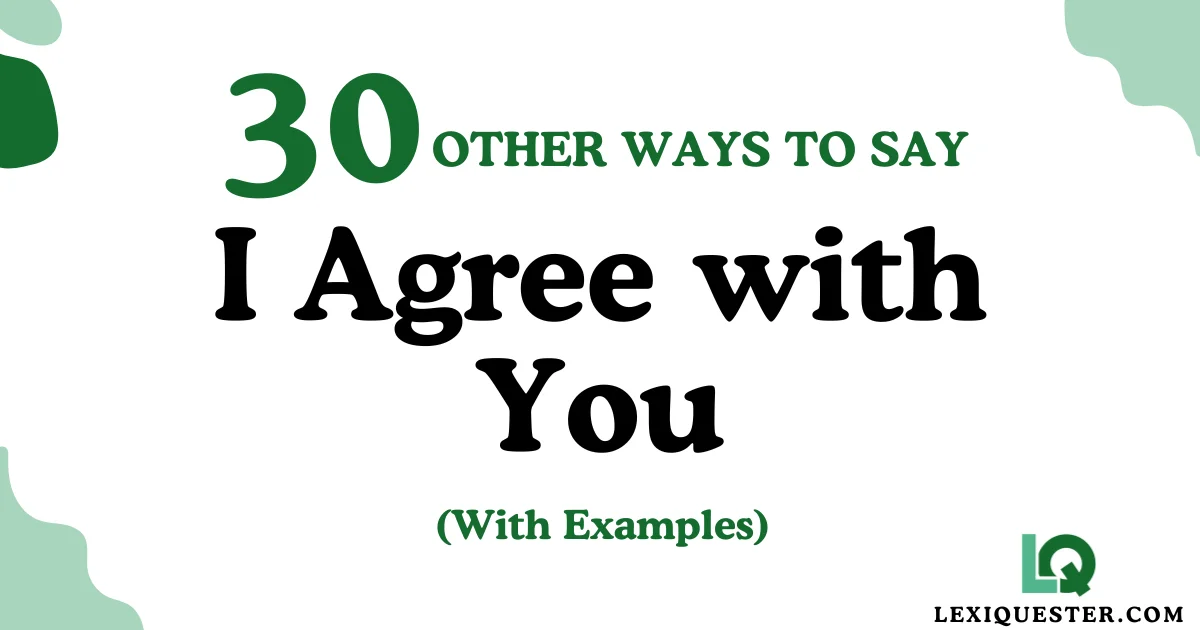In formal conversations, the words we choose can deeply impact the tone and effectiveness of our communication. Sometimes, saying “I agree with you” just doesn’t capture the level of respect or alignment we want to convey.
The following alternatives can add warmth, professionalism, and even empathy to your response, making your agreement feel meaningful and considered.
What Does “I Agree with You” Mean?
To say “I agree with you” means that you share the same viewpoint, opinion, or sentiment as the other person. It conveys alignment, understanding, and often a level of respect for the person’s perspective.
When to Use “I Agree with You”
Use “I agree with you” in conversations where you want to express a shared opinion or approval of the other person’s thoughts.
This phrase can be used in both personal and professional settings, though the wording may vary in formality.
Is It Professional or Polite to Say “I Agree with You”?
Yes, it’s both professional and polite to say “I agree with you,” as it shows respect and alignment with the speaker. However, formal alternatives can add an extra layer of thoughtfulness, especially in professional or diplomatic settings.
I Agree with You Synonym:
- I’m in Full Agreement
- Your Point is Well-Taken
- I See Eye-to-Eye with You on This
- I Share Your Perspective
- I Am of the Same Opinion
- I Would Second That
- I’m Aligned with Your Thinking
- I Respectfully Concur
- Your View Reflects My Own
- I Appreciate and Support Your Viewpoint
- I Find Myself in Agreement with You
- Your Insight Resonates with Me
- I Stand with You on This Point
- I Believe You’re Right
- I Fully Support Your Position
- You Make a Compelling Point
- I’m of the Same Mind
- I Can’t Disagree with That
- That’s a Valid Observation
- I’ll Echo Your Sentiments
- I Find Your Argument Persuasive
- I Can Align with That Perspective
- You’re Making a Strong Case
- I Hold the Same Belief
- I’m Swayed by Your Perspective
- You’ve Summed It Up Perfectly
- I Concur with Your Analysis
- I Endorse Your View
- Your Recommendation Has My Full Support
- I Am in Accord with You
1. “I’m in Full Agreement.”
Meaning: Complete alignment with the other person.
Explanation: Shows you fully endorse the other person’s point.
Example: “I’m in full agreement with your proposal on the project timeline.”
Tone: Professional, supportive
2. “Your Point is Well-Taken.”
Meaning: You understand and respect their perspective.
Explanation: This phrase validates their insight and shows respect.
Example: “Your point is well-taken regarding the budget adjustments.”
Tone: Respectful, thoughtful
3. “I See Eye-to-Eye with You on This.”
Meaning: Complete alignment, especially in personal views.
Explanation: Conveys a shared vision or understanding.
Example: “I see eye-to-eye with you on this strategy.”
Tone: Unified, informal
4. “I Share Your Perspective.”
Meaning: Expresses that you hold the same opinion.
Explanation: Emphasizes empathy and alignment in understanding.
Example: “I share your perspective on the need for a more streamlined process.”
Tone: Empathetic, insightful
5. “I Am of the Same Opinion.”
Meaning: Directly mirrors their view.
Explanation: Clear, direct, and formal.
Example: “I am of the same opinion regarding the need for additional resources.”
Tone: Concise, formal
6. “I Would Second That.”
Meaning: Adds formal support to their view.
Explanation: Often used in meetings or discussions to show support for an idea.
Example: “I would second that, particularly with respect to the new policy.”
Tone: Affirmative, supportive
7. “I’m Aligned with Your Thinking.”
Meaning: Indicates a shared perspective.
Explanation: Highlights a mutual understanding and professional rapport.
Example: “I’m aligned with your thinking on prioritizing customer satisfaction.”
Tone: Collaborative, affirming
8. “I Respectfully Concur.”
Meaning: Shows both agreement and respect.
Explanation: A formal and polite way to agree.
Example: “I respectfully concur with your analysis.”
Tone: Polite, formal
9. “Your View Reflects My Own.”
Meaning: Mirrors their opinion.
Explanation: Adds warmth by emphasizing shared thoughts.
Example: “Your view reflects my own on this matter.”
Tone: Warm, agreeable
10. “I Appreciate and Support Your Viewpoint.”
Meaning: Acknowledges and agrees with their stance.
Explanation: Expresses gratitude and alignment.
Example: “I appreciate and support your viewpoint on our upcoming initiatives.”
Tone: Supportive, thoughtful
11. “I Find Myself in Agreement with You.”
Meaning: Agreement with a thoughtful tone.
Explanation: Adds a subtle sense of thoughtfulness to the agreement.
Example: “I find myself in agreement with you on the need for additional training.”
Tone: Considerate, reflective
12. “Your Insight Resonates with Me.”
Meaning: Suggests that their thoughts struck a chord with you.
Explanation: Conveys that their perspective is meaningful to you.
Example: “Your insight resonates with me on the direction we should take.”
Tone: Warm, empathetic
13. “I Stand with You on This Point.”
Meaning: Shows solidarity and support.
Explanation: Good for moments of mutual support or agreement.
Example: “I stand with you on this point regarding fair labor practices.”
Tone: Supportive, encouraging
14. “I Believe You’re Right.”
Meaning: Indicates a strong belief in their correctness.
Explanation: Adds conviction to your agreement.
Example: “I believe you’re absolutely right about revising our goals.”
Tone: Confident, reassuring
15. “I Fully Support Your Position.”
Meaning: Strong support for their stance.
Explanation: Implies both understanding and readiness to back them up.
Example: “I fully support your position on improving workplace safety.”
Tone: Supportive, affirmative
16. “You Make a Compelling Point.”
Meaning: Conveys that their argument is convincing.
Explanation: Shows you value their well-thought-out perspective.
Example: “You make a compelling point regarding the need for increased oversight.”
Tone: Respectful, thoughtful
17. “I’m of the Same Mind.”
Meaning: Expresses a shared viewpoint in a formal way.
Explanation: Adds a professional yet warm tone to your alignment.
Example: “I’m of the same mind regarding our approach to customer service.”
Tone: Agreeable, collaborative
18. “I Can’t Disagree with That.”
Meaning: Subtly affirms agreement by negating disagreement.
Explanation: Polite and understated, good for minor points.
Example: “I can’t disagree with that, especially after seeing the recent data.”
Tone: Subtle, Professional
19. “That’s a Valid Observation.”
Meaning: Acknowledges their observation as accurate or valid.
Explanation: Often used to recognize a valuable insight.
Example: “That’s a valid observation about the team’s recent productivity.”
Tone: Respectful, considerate
20. “I’ll Echo Your Sentiments.”
Meaning: Shows that you feel similarly.
Explanation: Adds depth to your agreement by mirroring their sentiment.
Example: “I’ll echo your sentiments on enhancing the training program.”
Tone: Thoughtful, empathetic
21. “I Find Your Argument Persuasive.”
Meaning: Acknowledges their ability to make a compelling point.
Explanation: Good for situations where you’re convinced by their logic.
Example: “I find your argument persuasive regarding this policy update.”
Tone: Respectful, considerate
22. “I Can Align with That Perspective.”
Meaning: Emphasizes your willingness to follow their point of view.
Explanation: Great for discussions where alignment is key.
Example: “I can align with that perspective on employee welfare.”
Tone: Collaborative, agreeable
23. “You’re Making a Strong Case.”
Meaning: Acknowledges the strength of their point.
Explanation: Shows you’re impressed by their logic and agree.
Example: “You’re making a strong case for re-evaluating the budget.”
Tone: Supportive, affirmative
24. “I Hold the Same Belief.”
Meaning: Expresses a shared conviction or value.
Explanation: Good for shared values or philosophical points.
Example: “I hold the same belief in the importance of ethical sourcing.”
Tone: Aligned, thoughtful
25. “I’m Swayed by Your Perspective.”
Meaning: Indicates that they have influenced your opinion.
Explanation: Useful when their points have genuinely changed your view.
Example: “I’m swayed by your perspective on implementing new practices.”
Tone: Respectful, open-minded
26. “You’ve Summed It Up Perfectly.”
Meaning: Affirms their accurate and concise summary.
Explanation: Adds admiration for their clarity.
Example: “You’ve summed it up perfectly regarding our goals.”
Tone: Appreciative, affirming
27. “I Concur with Your Analysis.”
Meaning: Agrees with their detailed breakdown.
Explanation: Often used in analytical or strategic discussions.
Example: “I concur with your analysis of the market trends.”
Tone: Professional, affirmative
28. “I Endorse Your View.”
Meaning: Shows solid agreement and support.
Explanation: Good for professional environments needing endorsement.
Example: “I endorse your view on refining our process.”
Tone: Supportive, affirmative
29. “Your Recommendation Has My Full Support.”
Meaning: Strongly agrees with their suggestion.
Explanation: Often used to show official or full backing.
Example: “Your recommendation has my full support on this initiative.”
Tone: Supportive, encouraging
30. “I Am in Accord with You.”
Meaning: Complete alignment in a formal context.
Explanation: One of the most formal ways to show agreement.
Example: “I am in accord with you on the next steps.”
Tone: Formal, aligned
Conclusion
Expressing agreement in formal ways doesn’t have to sound robotic or impersonal. Using thoughtful alternatives adds a layer of professionalism and empathy, especially in workplace settings or important discussions.
Try these expressions next time you want to support someone’s point of view with a tone that’s both professional and considerate.
Recent Posts
- 30 Other Ways to Say ‘Have a Safe Trip’ (With Examples)
- 30 Other Ways to Say ‘It Was Good to See You Again’ (With Examples)
- 30 Other Ways to Say “The End” in A Story (With Examples)
- 30 Other Ways to Say ‘My Name Is’ (With Examples)
- 30 Other Ways to Say “In the Text It States” (With Examples)

Daniel Jack is a passionate writer and founder of LexiQuester, a platform dedicated to unraveling the mysteries of words and language. With a love for storytelling and linguistic exploration, he crafts engaging content that inspires curiosity. When he’s not writing, Daniel enjoys diving into books and discovering hidden gems of knowledge.














